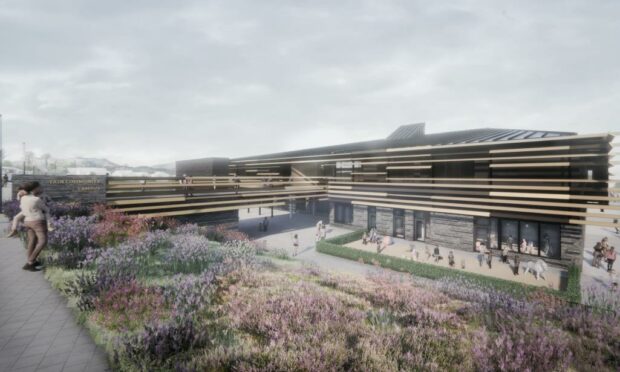Councillor Maxine Smith says modular builds could deliver 10 Highland schools for the price of three.
Ms Smith is calling on the Highland Council administration to take bold steps in delivering new schools across the region.
The independent councillor believes that modular construction could help Highland Council to deliver more schools, quicker and cheaper.
Ms Smith first raised the idea of modular schools in the last political term, as co-leader of the SNP opposition.
However, it requires a radical change of thinking, and Ms Smith feels the council is afraid to make the leap.
“It’s a lot easier just to carry on the way you’ve always done things, but if you’ve got the will to do it, you could deliver schools a lot cheaper,” says Ms Smith.
What is a modular school?
A modular building is one that is constructed off-site as individual units and then transported to its final site and assembled there.
Ms Smith served on the board of Albyn Housing Association for 17 years, and first discovered modular schools on a site visit to York.
“We were exploring ways of building social housing cheaper, and we visited a company called Yorkon, which is part of Portakabin group,” she says.
“They have these massive warehouses where they build all these different units – schools, everything – and then they ship them to site and put them all together like a giant jigsaw.”
On their website, Portakabin advertises a range of modular units for schools, covering everything from toilets and dining halls to music rooms and science labs. They say modular classrooms can be delivered 70% quicker than traditional builds.
Following the Grenfell tragedy, the company delivered a new temporary school onsite capable of accommodating 1,000 pupils. At nine weeks to completion, Portakabin say it’s the fastest school build in UK history.
That particular school may be a temporary build, but Ms Smith says the potential is clear. “Modular schools can be delivered in record time – from inception to having the building complete was something like three months,” she says.
“I visited a nursery that only cost about £2m to build, where Highland Council would have spent up to £20m. Then there was an academy that cost £10m, whereas Alness Academy and Wick campus cost the council around £40m.
“Just do the maths. We could build four schools for that price. It’s an absolutely crazy waste of public money but all local authorities are doing it, so everyone just accepts it.”
Schools hang in the balance as council reviews capital plan
However, Ms Smith believes that could all be about to change. She may no longer be a member of the ruling SNP group, but Ms Smith is keen to reopen discussions about the potential for modular builds.
The discussion feels timely, with Highland Council having recently admitted it can no longer afford its capital plan. Project costs have increased 20% with inflation, while loan charges soar.
“We need to build at least 10 to 15 schools on the capital programme,” says Ms Smith. “We will never manage that and in the next five years we’ll be lucky to do three or four. Whereas the modular approach could deliver 10 schools for the price of three.”
The obvious drawbacks are the lack of architectural interest. Up until now, Highland Council’s school builds have been bespoke, reflecting a strong sense of place.
Besides that, Ms Smith said there was pushback in the past from council bosses who wanted to ensure the work for Highland construction stays in Highland.
Ms Smith argues that for many of the large UK companies, a package of contracts in Highland would offer economies of scale, allowing them to open a base up here too. That way, the work stays in the Highlands.
“The council needs to really explore the options properly now, not just pay lip service,” she says. “It’s time to knuckle down and accept that maybe things have to change.”
Education chairman says all options are on the table
Education chairman John Finlayson welcomes the idea of modular schools, provided they can be delivered to the right spec.
“This is a very difficult time, with the rising cost of materials, of construction costs generally and the immense pressures on the council’s capital programme,” he said.
“I think it is sensible that all options are looked at in terms of how schools are built. I am aware that officers are indeed looking at all options.
“Modular classrooms are nothing new. In Highland, we already provide many high quality modular units at a number of schools.
“However, we also need to remember that any new school buildings must also comply with high energy efficiency standards. As such, the proposed news schools for places like Broadford and Dunvegan are being designed using passive house design.
“Going forward, I am sure a modular approach that also uses this technology will be available. Highland will indeed be keen to look at any and all options that provide high quality, value for money buildings as we continue to improve our vast school estate.”
Are you interested in more exclusive and breaking Highland and Islands news from the P&J? If so, why not join our dedicated new Facebook page HERE



Conversation